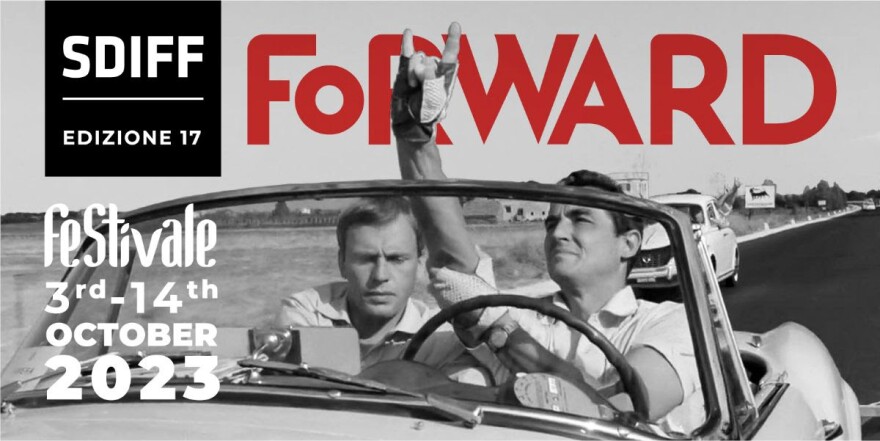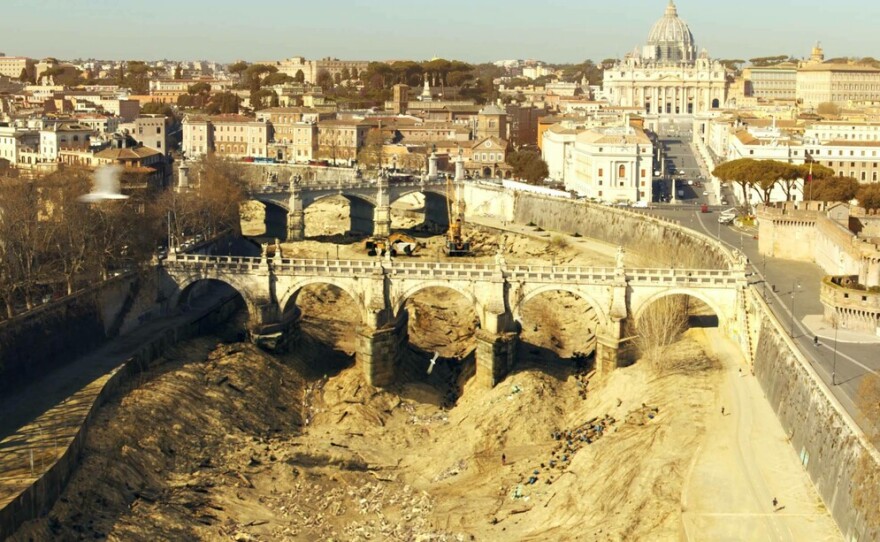The San Diego Italian Film Festival (SDIFF) returns to the Museum of Photographic Arts (MOPA) tonight, Oct. 5, through Oct. 14 for its 17th year.
The San Diego Italian Film Festival was the passion project of Victor Laruccia who envisioned a film festival as a "piazza" where people could gather and create a vibrant community around movies. Laruccia died last year but the festival remains true to his vision.
This will be the second "feStivale" without Laruccia but he is being remembered in the theme chosen for this year.

"This year's theme is going to be 'Forward,'" explained Antonio Iannotta, SDIFF's artistic director. "We promised Victor to move on and to go on with our San Diego Italian Film Festival. So 'Forward' had to be the theme, and we chose a design and a graphics based on one of Victor's favorite movies from the past, a classic from the 60s, 'Il Sorpasso,' by Dino Risi. And so now we really look forward to start the new edition of 'feStivale.' So it's been very difficult. It is still difficult, and it's going to be very difficult for a long time because Victor was, and is, very dear to our hearts. I'm speaking personally, but I know that this sentiment is shared by a great community of people interested in the arts and culture in San Diego."
Laruccia's vibrant presence is indeed missed but SDIFF keeps his legacy alive by once again showcasing films that reveal an Italian perspective. But this year that perspective is turned to such diverse themes as history, climate change, immigration, damnation and redemption as well as standing up to patriarchy.
The opening night film, "Siccita (Dry)," tackles climate change through the lens of science fiction as it presents a near future where Rome is dealing with extreme drought and disease.
"Science fiction is one of my favorite genres," Iannotta said. "But it's not a genre that Italian movies today deal with (within) the rules of the genre. It's more like in the background. It's more like in a possible dystopic future. But it has to be very realistic in a way. And the movie really plays with that. And to be in a Rome that has been so deeply affected by such a catastrophe, it's going to be very interesting. But we know that Rome is the eternal city. So in a way, we know that it's going to survive."

The film uses the dystopian setting as a backdrop for a sprawling tale of intersecting lives. It also plays as a COVID-19 film since Italy was one of the country's hardest hit by the pandemic. The way the characters and the government deal with the drought and disease feels like a creative means of processing what the country went through, and that resonates for all of us.
While that film looks forward to the future with a cautionary tale, "Primadonna (The Girl From Tomorrow)" tells a story from the past that helped change the future of Italy.
"Primadonna" is inspired by the true story of Franca Viola, a 17-year-old girl from Sicily, who, in the 1960s, was the first woman in Italy to say no to a “rehabilitating marriage” (“matrimonio riparatore” in Italian) with the man who kidnapped and raped her.
"That was a brutal law," Iannotta said. "But Franca Viola said no. No, thanks. I don't want to do that. First, her family was opposing her decision, but her father really helped her to carry on. And she became, and she's still, a symbol for the power of women to go against this brutal form of patriarchy that is still on in societies everywhere, also here in the states. Let's think about the difficulties and the attack towards women rights at-large and still in Italy."
One of the short films, "Un milione di italiani (non sono italiani)," looks at another Italian law that is demands scrutiny, this time involving immigration.
"The film is called 'A Million Italians are not still Italians.' And that's because if you come to Italy and you're an immigrant, and you have children in Italy. The children that are born in Italy, their only country has been Italy, they speak Italian, they go to school. Well, they're not Italians. They can apply for citizenship when they turn 18, but it's not their right. And that's just plain wrong. Most of Italians want to change this law. We have a very conservative government right now in Italy. So it's not going to happen today, but it will happen eventually."
Again, the story and perspective are distinctly Italian but the stories resonate here.
"That's the reason why we have this festival and our festival has been successful exactly for this reason. Even though it's an Italian film festival and we have Italian features, shorts, dramas, comedies that are very specifically rooted in Italian culture. But there is always a possibility to create a dialog about topics, issues, problems, questions that are relevant here, here in San Diego, in a city that is on the border with Mexico. So most of our movies have introductions that provide a cultural, historical context. But even more important, Q&A's as dialogs, opportunities for everybody in the audience to ask a question, to make a comment, and to see if we can use movies not just for our entertainment, that it's already great and beautiful, but also to think about something that is relevant today."
And something that Laruccia would be proud of.
Another program that Laruccia initiated with Iannotta was the Ristretto Awards, which selects shorts films and presents awards to the best.
"We started talking about this program maybe ten years ago. And then all of a sudden, we decided, okay, we don't have sponsors, we don't have money, but we want to do it," Iannotta recalled. "This is our fifth edition. We received more than 100 submissions. The competition is open to everybody. It's open to Italian directors but also directors from all over the world that deal with an Italian topic. And this is the first year that we have decided to screen all the finalists. Not only online, so people can buy a pass and also vote for their favorite movie for the audience award but also in a theater, also on a big screen here at the Digital Gym."
Once again I served on the jury for the Ristretto Awards and can vouch for the amazing quality of the films. The awards will be presented on Oct. 14 at the gala party at the Museum of Photographic Arts (MOPA).
The San Diego Italian Film Festival runs through Oct. 14 with both in-person and online film screenings. The full schedule is online. All films are at the Museum of Photographic Arts with the exception of the Ristretto shorts screening Oct. 10 at Digital Gym Cinema.







